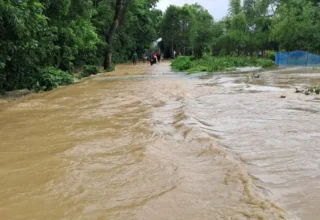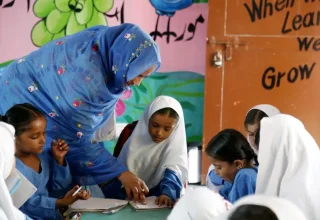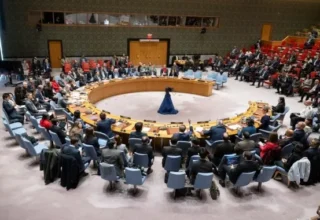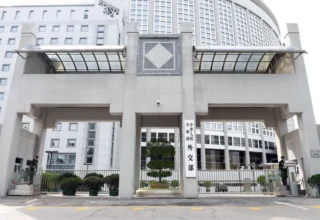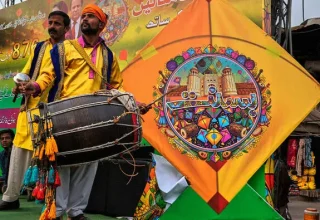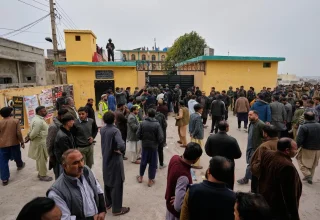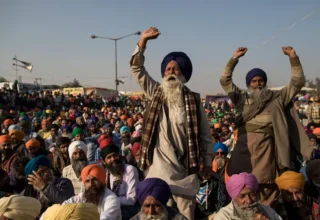
When Navdeep Singh, a 30-year-old farmer, flew back home from India-controlled Ladakh area in March, he was stunned to see police and special forces commandos awaiting in the parking of India’s Chandigarh airport.
Without showing a warrant or saying a word, two officers grabbed his shoulders and put him into a car, which sped to a police station in Ambala, reaching it within 35 minutes, far shorter than the normal 90-minute drive ther from the airport.
Navdeep had been arrested and imprisoned for three months and claims to have been subjected to torture for his participation in a wave of farmers’ sit-ins which started early this year. The protests, which demand government support to farmers which they consider essential for their survival, have disrupted communication between India’s northern states of Punjab and Haryana (disrupted communication between the two states or with the capital?).
“It’s a matter of life and death, we cannot give up. If I lose my life in this cause it’s a big achievement for me since land is like a spiritual mother to us and destruction of agriculture is an attack on our religion” said Navdeep, who lives in Anandpur Jalbera village in Ambala city of Haryana.
The local farmers of Punjab and Haryana have now intensified a second round of their agitation and announced plans to march on the capital, New Delhi. They are mainly demanding minimum support price (MSP) and a complete forgiveness of loans, without which they claim they cannot make a living.
“Of course, the farmers are in a vulnerable situation, their frustration is valid, they are struggling, they don’t have much income and their agriculture looks unsustainable,” said Surinder Jodhka, professor and an expert on social systems at Jawaharlal Nehru University, New Delhi.
“They are asking the state to give attention to them and what the state needs to do is to invest in agriculture and provide support in various forms,” he added.
Under the banner of Samyukta Kisan Morcha (SKM-apolitical) and Kisan Mazdoor Morcha (KMM), the farmers have decided a foot march towards the capital from Dec. 6 in small groups of 50-100. While Jagjit Singh Dallewal, leader of SKM-apolitical, announced to sit on a fast unto death at Punjab-Haryana Shambu border area.
According to India’s National Crime Record Bureau (NRCB), at least 112,000 people working in the agricultural sector have committed suicide over the last decade in the country. The figures revealed that 11,290 farmers took their own lives in 2022 alone.
The statistics are widely considered as low estimates. According to Neeraja ulkarni of Fair Observer, a recent analysis of real number of farmer suicides in the state of Punjab is nearly five times the figures published by NCRB.
“In case of any calamity or a mishap, if a farmer’s harvest gets destroyed he is left with no other option then to take a loan for more harvest,” said Harvinder Singh, a 38-year-old farmer. “Resultantly, the interest and the principal amount makes a situation inviable for a farmer, and he eventually commits suicide,” Harvinder added.
Due to last year’s flood, Harvinder said that his own harvest was destroyed and now he is heavily indebted despite having 12-14 acres of his own agricultural land.
The agitation is providing a ray of hope to Harvinder and other protesting farmers who have been spending their days and nights in the sit-ins. However, the government remained unresponsive towards them.
In a recent press conference, Sarvan Singh Pandher, coordinator of KMM, said that farmers have been sitting at Punjab-Haryana borders of Shambhu and Khanauri since Feb. 13 and the last meeting with the government took place on Feb. 19 which was inconclusive.
Nearly 30 farmers have died in the sit-ins but the government is not at all bothered, he added.
The two associations gave a similar call on Feb. 13. However, police stopped them from moving forward through tear gas shelling. Since then they have been sitting at these inter-state boundaries blocking the highways.
Contrary to this, they faced no significant obstacle in 2020-21 when they marched towards Delhi with their tractors.
In September 2020, the central government passed three bills, claiming that these laws would diminish the government’s involvement in agriculture and create greater opportunities for the private sector.
Against these laws, the farmers in Punjab started protests and termed the laws as corporatization of agricultural industry, saying that elimination of government protections would make them vulnerable to India’s powerful corporate sector.
Over 200 farmers’ organizations joined the protest. The farmers had various demands including the revocation of these laws.
In November 2021, the government said it would repeal them.
“I do not see they will manage to achieve it because a protest movement might get an adverse law withdrawn. But to have a proactive measure, especially one which has deep economic implications, I do not think that we have that kind of momentum in the space of protest politics,” Janaki Srinivasan, assistant professor in the department of political science at Panjab University. She said the movement has generated overall a lot of “good will” among the masses domestically as well as internationally. However, MSP is a “fairly complicated issue” and it requires the center and the states to actually come out with a common agricultural policy, “which is not happening”. “So something like an MSP will not happen, at the most, what will happen is a continuation of status quo,” Srinivasan added.
Unlike the previous round, this time around the media and the civil society seems uninterested in the movement.
But the farmers also determined against these odds and have even put their lives on stake. They have announced that if Dallewal dies during his fast then another person would start one.
“We cannot stop our struggle, considering people are supporting us or not,” said Dallewal, a week before start of his fast unto death (while he present in the sit-ins) at Khanuri border.
He added that “this fight is for the rights and survival of our future generations, we cannot give-up.”



















